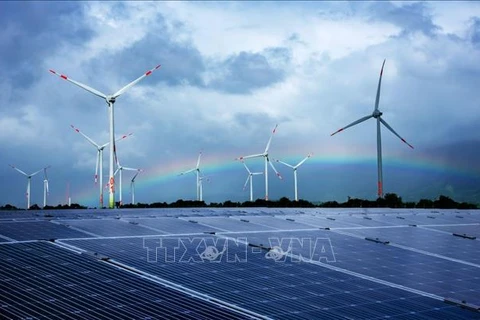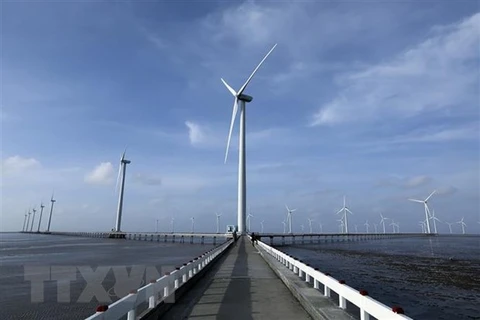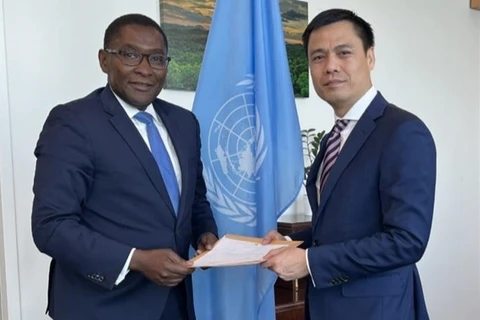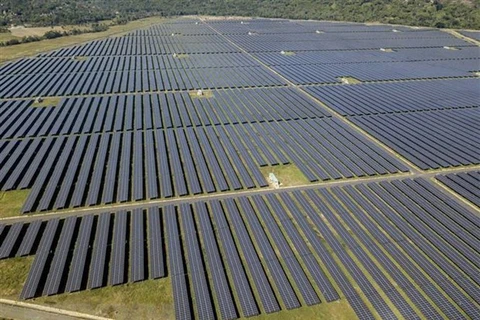Hanoi (VNA) – To develop a green and sustainable economy and adapt to climate change, Vietnam has been stepping up energy transition by capitalising on internal strength and enhancing cooperation with development partners, an official has said.
Addressing a seminar in Hanoi on June 22, Hoang Tien Dung, Director of the Electricity and Renewable Energy Authority at the Ministry of Industry and Trade, said as Vietnam is a dynamic economy with fast growth for many consecutive years, demand for energy, especially electricity, has been on the rise.
With its own efforts and assistance from partners, the country is gradually reducing power sources using fossil fuel and promoting new, clean, and renewable energy, he said, noting that this is also an inevitable trend that helps guarantee a sustainable economy.
So far, Vietnam has obtained certain results in increasing the share of renewable power in its power system. It is planning to develop lower-carbon power generation and accelerate fuel transition in the coming time, Dung said.
However, the official pointed out that the emergence of new electricity sources has also posed the system to sustainability and stability challenges, which requires coordination in terms of both policy and technology to ensure trustworthy power generation.
Sean M. Lawlor, an energy expert from the US Embassy, said as a long-term partner of Vietnam, the US is recommending Vietnam to take creative policy measures to attract foreign investment and step up energy transition so as to help implement the commitments Prime Minister Pham Minh Chinh made at the 26th UN Climate Change Conference of the Parties (COP26).
Narendra Asnani, director for services at GE Gas Power in Asia, said lower-carbon energy sources like gas and such solutions as hydrogen and carbon capture technologies can help Vietnam achieve carbon neutrality.
With its long-term presence in Vietnam and the commitment to help boost local economic growth through the application of the newest energy efficient technologies, GE is providing suitable solutions and global experience for Vietnam to meet current demand and sustain growth, he added.
At the seminar, experts proposed several measures for boosting energy transition in Vietnam.
Coal-fired power is making up one-third of Vietnam’s total output. The country looks to reduce the proportion of this type of electricity to about 9.5 percent and raise renewable energy to 32 percent by 2045. It is also encouraging low-carbon power sources to cut down emissions and support renewable energy./.
Addressing a seminar in Hanoi on June 22, Hoang Tien Dung, Director of the Electricity and Renewable Energy Authority at the Ministry of Industry and Trade, said as Vietnam is a dynamic economy with fast growth for many consecutive years, demand for energy, especially electricity, has been on the rise.
With its own efforts and assistance from partners, the country is gradually reducing power sources using fossil fuel and promoting new, clean, and renewable energy, he said, noting that this is also an inevitable trend that helps guarantee a sustainable economy.
So far, Vietnam has obtained certain results in increasing the share of renewable power in its power system. It is planning to develop lower-carbon power generation and accelerate fuel transition in the coming time, Dung said.
However, the official pointed out that the emergence of new electricity sources has also posed the system to sustainability and stability challenges, which requires coordination in terms of both policy and technology to ensure trustworthy power generation.
Sean M. Lawlor, an energy expert from the US Embassy, said as a long-term partner of Vietnam, the US is recommending Vietnam to take creative policy measures to attract foreign investment and step up energy transition so as to help implement the commitments Prime Minister Pham Minh Chinh made at the 26th UN Climate Change Conference of the Parties (COP26).
Narendra Asnani, director for services at GE Gas Power in Asia, said lower-carbon energy sources like gas and such solutions as hydrogen and carbon capture technologies can help Vietnam achieve carbon neutrality.
With its long-term presence in Vietnam and the commitment to help boost local economic growth through the application of the newest energy efficient technologies, GE is providing suitable solutions and global experience for Vietnam to meet current demand and sustain growth, he added.
At the seminar, experts proposed several measures for boosting energy transition in Vietnam.
Coal-fired power is making up one-third of Vietnam’s total output. The country looks to reduce the proportion of this type of electricity to about 9.5 percent and raise renewable energy to 32 percent by 2045. It is also encouraging low-carbon power sources to cut down emissions and support renewable energy./.
VNA

























